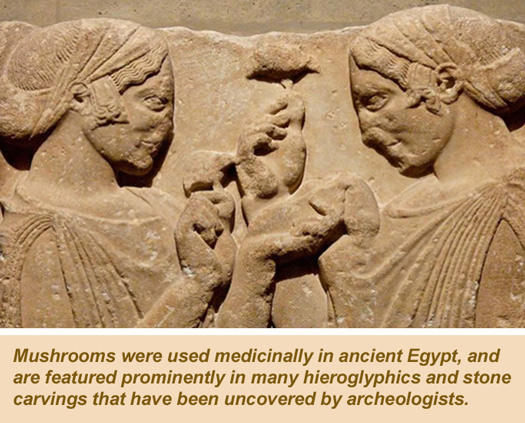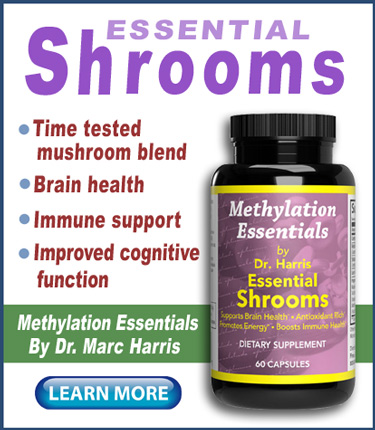Both the ancient Chinese and Egyptian civilizations honored mushrooms as “gifts from God.” And no wonder: not only could mushrooms fill the belly when hungry, many types of mushrooms were also found to have healing properties.
Today–some 3,500 years later–mushrooms are finally starting to be recognized in Western countries for their healing properties.
One of the healing benefits of mushrooms being studied most keenly is how some species appear to prevent and treat neurodegenerative diseases.
A new review, published in Nutrients in May 2023, reported that mushroom constituents “exhibit significant anti-neurodegenerative activities” and urged further research to explore the mechanisms involved.
These constituents include polysaccharides, peptides, phenols, terpenes and nucleosides. These active compounds have been shown to be potent anti-inflammatory antioxidant agents; however, the most unique benefits they provide lies in their ability to stimulate neuron growth and delay cell decay (apoptosis).
The Chinese researchers conclude: “The information collected in this review suggests that mushrooms and their metabolites have broad application prospects in the management of Alzheimer’s disease, as well as neurodegenerative diseases more widely.”
The miracle of mushroom metabolites
The scientists involved in the review came to their conclusions after assessing the findings of 86 different studies—an impressive number for a scientific review.
The studies were qualified out of the ScienceDirect database using industry-standard guidelines. The researchers analyzed research articles published between 2010 and 2023 with the key words “mushrooms” and “Alzheimer’s disease.”
“The polysaccharides contained within hyphae of mushrooms have been observed to prevent neuronal apoptosis and oxidative damage, whilst reducing amyloid beta peptides (Aß) which are found to be the main component of amyloid plaques which characterize patients with Alzheimer’s disease,” the researchers wrote in the study findings.
In noting the versatility of mushrooms, the researchers highlighted two particular species with a long tradition of use in Asia: “Historically, many wild mushrooms, such as Ganoderma lucidum and Cordyceps, have a wide range of edible and medicinal potential because of their diverse biological functions, nutritional value, and delicious taste.”
Peptides and ergothioneine
The review also analyzed the benefits of the peptides contained within mushrooms. Peptides are short chains of amino acids.
Did you know?
• Mushrooms are used in their natural state for herbal medicine.
• Mushrooms provide compounds which are extracted for making pharmaceutical drugs.
• Mushrooms can be dried and encapsulated for manufacturing nutritional supplements.
• Mushrooms are a versatile, inexpensive food packed with protein.
• Mushrooms can be ground into a powder to use as a coffee alternative.
• Mushrooms biodegrade quickly and are easy on the environment.
• Mushrooms grow from spores into an edible food in just one to two months.
Studies have shown they provide a neuroprotective effect by reducing reactive oxygen species. Furthermore, some mushroom peptides have demonstrated protection against nerve damage within the brain.
Finally, ergothioneine—an amino acid that is acquired exclusively through the diet—was reported to be another beneficial compound that is found in large quantities in many mushroom species.
Health enthusiasts buy ergothione supplements to support general health, and to counter joint pain, liver damage, cataracts, Alzheimer’s disease, diabetes, heart disease, wrinkles, and more.
In the current review researchers noted that low blood levels of the critical amino acid were, indeed, associated with an increased risk of Alzheimer’s disease development.
Cognitive decline epidemic
Cognitive decline is a disease of the elderly—and the elderly population is growing. As a percent of the world population, people over the age of 65 now make up an estimated 9%. That is a historically high amount, yet by the year 2050 it is expected this age group will make up a whopping 17% of the population. But the growing number of elderly people is only part of the problem: the rate of neurodegenerative disease in that population is also growing.
All of this means that the number of people suffering from a neurogenerative diseases will double in the next three decades. In the U.S. this equates to a rise from the current 6.5 million victims to more than 12 million.
Many current medications are targeted at the alleviation of neurodegenerative disease symptoms, yet there is a lack of effective preventative and treatment strategies for such conditions. Therefore, there is a significant interest in the research of developing effective treatment strategies.
Expect more attention and expanded studies to explore the vast untapped resources of mushrooms in the near future.
In the meantime, check out Essential Shrooms by Optimal Health Systems to learn more about the benefits of mushroom blend supplements.
– – –
Sources: Nutrients, Wikipedia (Neurodegenerative diseases).


